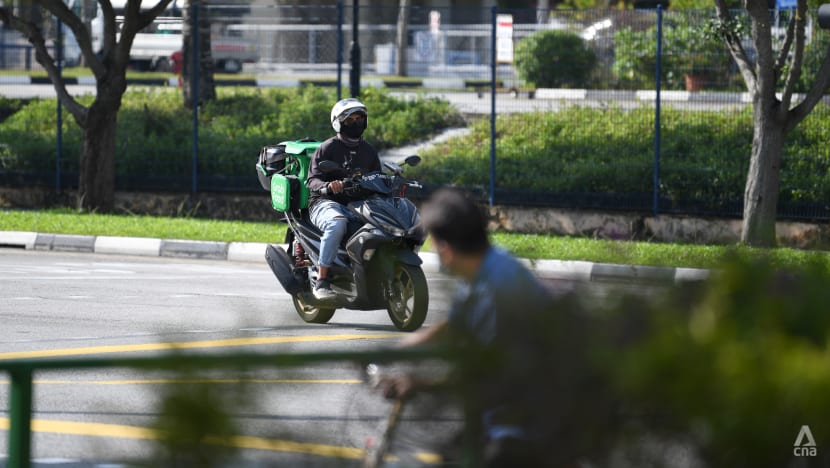Platform worker numbers stabilising; MOM to expand focus to higher-skilled gig roles
Looking ahead, the Ministry of Manpower must also track data on higher-skilled platform roles to plan for any policy interventions in platform economy developments for the future, its permanent secretary said.

A food delivery rider in Singapore. (File photo: CNA/Calvin Oh)

This audio is generated by an AI tool.
SINGAPORE: The labour market for platform workers in food delivery and ride-hailing appears to be stabilising, even as more primary platform workers are doing gig work out of personal preference, the Ministry of Manpower (MOM) said on Monday (Sep 29).
Primary platform workers are those who list platform work as their main job in MOM’s national survey on the sector. There were around 67,600 regular platform workers recorded in 2024, out of which around 60,000 consider the work their primary occupation.
The number of primary platform workers who do the job because they prefer to do so rose by an average of 7 per cent a year between 2016 and 2024, from 31,000 to 54,000, according to a media factsheet released by MOM on Monday.
"It's a growth industry, so it's not surprising that the numbers have grown," said MOM permanent secretary Ng Chee Khern.
"But I suspect that it's stabilising somewhat, at least for the current services. There could well be growth in other services in the future, but in terms of food delivery, ride-hailing, I think the market is stabilising."
He also said that MOM is monitoring data on higher-skilled platform roles and "cross-border remote work". Such data helps the ministry plan for any potential policy interventions needed for future platform economy developments.
Mr Ng was speaking to reporters at the first Global Dialogue on Digital Platform Work, co-hosted by MOM and the International Labour Organization (ILO) in Singapore.
The dialogue is meant to lay the groundwork for stronger international measurement standards on platform work, MOM and ILO said in a press release.
This is part of efforts to address data gaps on the platform economy and inform "inclusive, evidence-based and future-ready" policies, they said.
These discussions lead up to the 22nd International Conference of Labour Statisticians in 2028, where measurement standards on the digital platform economy will be presented.
DOING PLATFORM WORK BY CHOICE
Mr Ang Boon Heng, director of manpower research and statistics at MOM, said there was a surge in people who preferred platform work in 2022 as there was greater demand for point-to-point transport services provided by the likes of private hire drivers.
The slight dip after that can be attributed to the trend normalising back to pre-2022 levels, he said.
"This illustrates how platform work preferences can fluctuate with broader economic and social conditions," said Mr Ang.
"However, the underlying appeal of such work remains consistent – flexibility, freedom of choice, and more family time continue to be the top reasons workers choose this path."
Fifty-nine per cent of those in Singapore who said they prefer to do platform work cited flexibility in work hours and location as a reason.
Thirty-one per cent of respondents cited having freedom in the choice of work, and 13 per cent cited having more time for family.
Mr Ang said MOM's data collection on platform work formed a strong foundation of evidence that enabled well-calibrated interventions to address workers' needs.
The proportion of primary platform workers who said they faced challenges at this job fell from 71 per cent in 2017 to 18 per cent in 2024.
The most common challenge cited was related to the uncertainty of finding sufficient work. Those who said they faced this challenge fell from 49 per cent to 7 per cent.
Those citing challenges from healthcare-related concerns fell from 37 per cent to 5 per cent, and retirement-related concerns fell from 32 per cent to 4 per cent over the same time period.
Asked what has contributed to these decreases, MOM permanent secretary Mr Ng pointed to the Platform Workers Act, which addresses work injury compensation, retirement adequacy and union representation.
On earnings, platform work associations have helped by working with platform operators on the algorithms that allow workers to have a sustainable income stream, he told reporters.
“Looking ahead, we must also track higher-skilled platform roles, not just lower-income segments,” said Mr Ng.
“By preparing early – as we did with delivery and ride-hailing workers a decade ago – we can ensure timely data and policies for this next wave of platform work.”
MOM has been conducting dedicated national surveys on platform work since 2016.
















